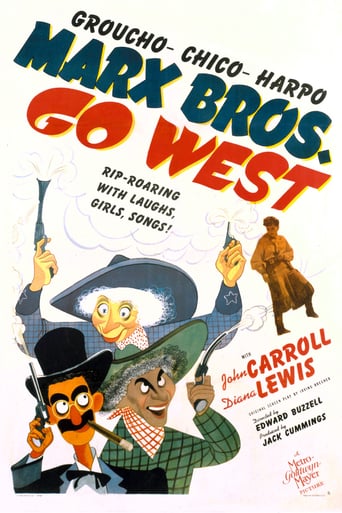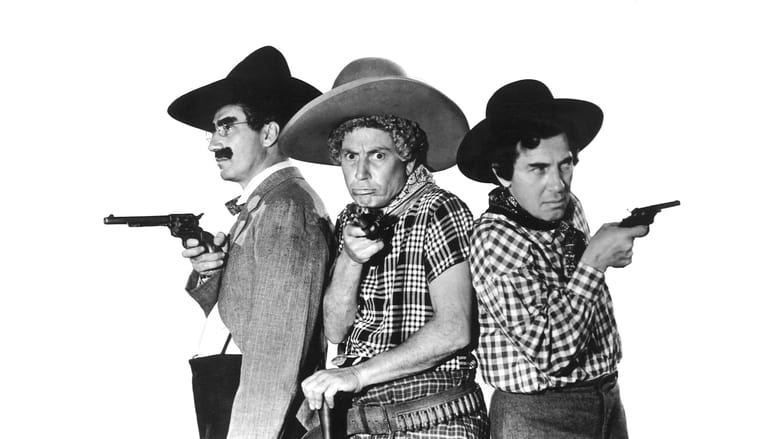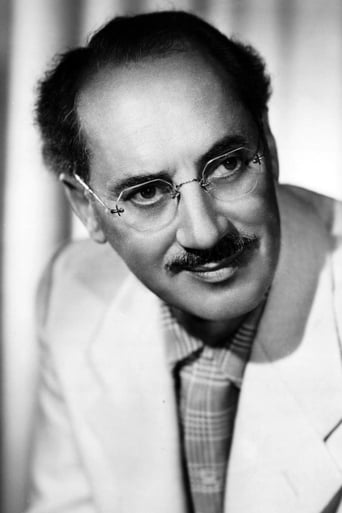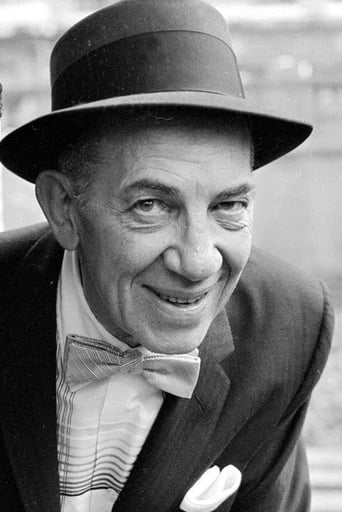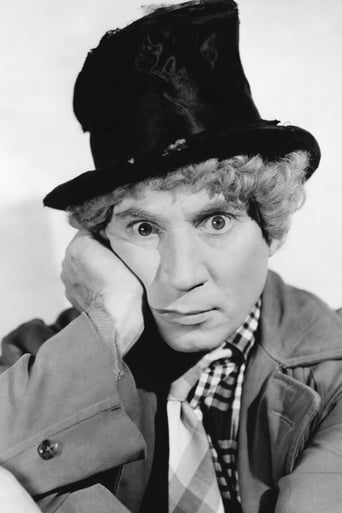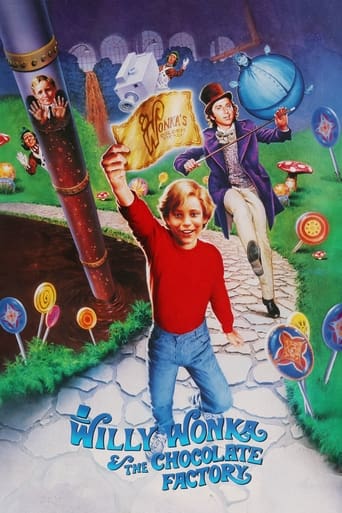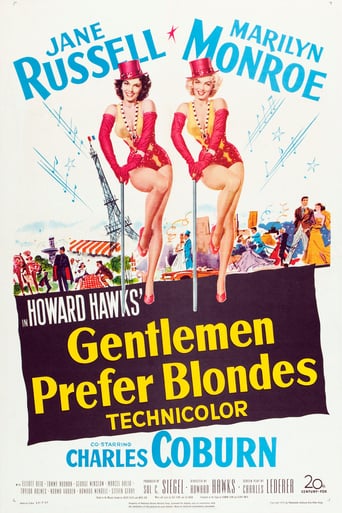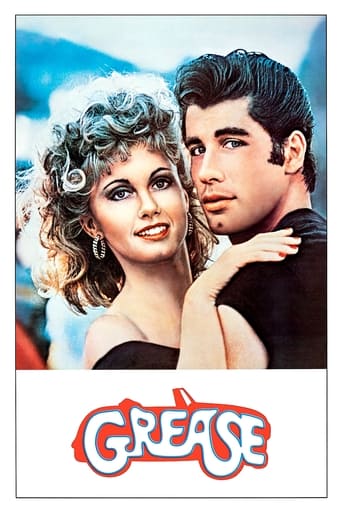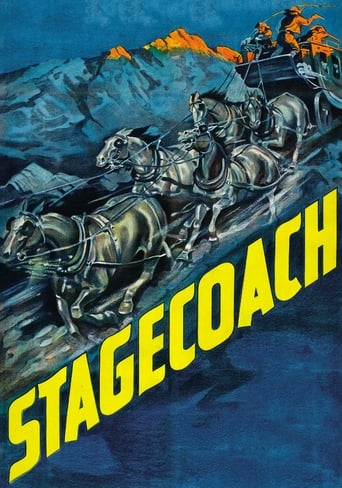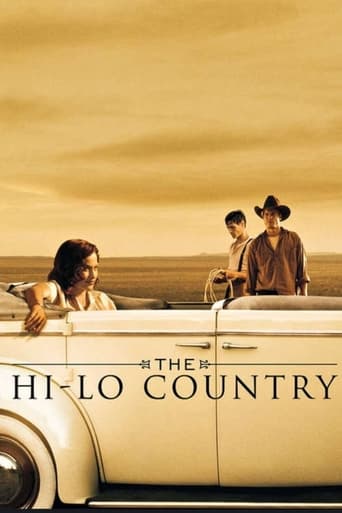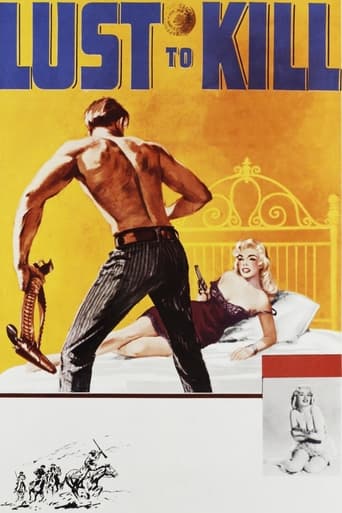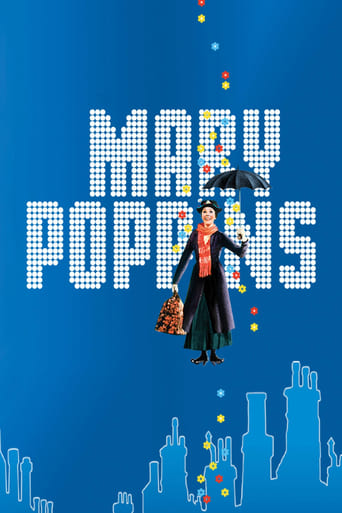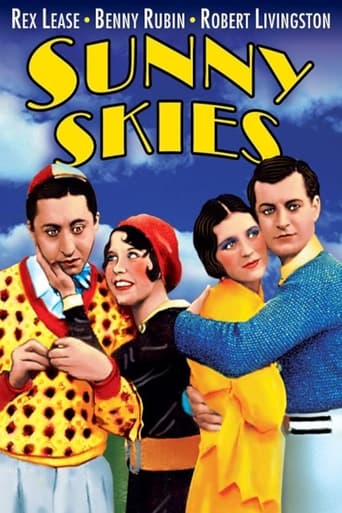Go West (1940)
Embezzler, shill, all around confidence man S. Quentin Quale is heading west to find his fortune; he meets the crafty but simple brothers Joseph and Rusty Panello in a train station, where they steal all his money. They're heading west, too, because they've heard you can just pick the gold off the ground. Once there, they befriend an old miner named Dan Wilson whose property, Dead Man's Gulch, has no gold. They loan him their last ten dollars so he can go start life anew, and for collateral, he gives them the deed to the Gulch. Unbeknownst to Wilson, the son of his longtime rival, Terry Turner (who's also in love with his daughter, Eva), has contacted the railroad to arrange for them to build through the land, making the old man rich and hopefully resolving the feud. But the evil Red Baxter, owner of a saloon, tricks the boys out of the deed, and it's up to them - as well as Quale, who naturally finds his way out west anyway - to save the day.
Watch Trailer
Cast


Similar titles
Reviews
"Most comedians and comedy teams have had their tilt at the West. This Marx Bros entry certainly starts promisingly, but fails to live up to that promise until that grandest of all slapstick climaxes in which the Bros demolish a whole real train! That's the sequence everyone remembers." The above paragraph reproduces what I wrote about Go West years ago in my TV previews page in a weekly magazine. I don't think that way any more. In fact, it's the opening that I now regard as a sour note in an otherwise frolic-filled mixture of fun and song. That wheezy old stage routine with the fly-away $10 note and the change in nine dollars isn't even welcome in the first place, let alone does it merit being played out to such excruciating length. Once the action actually hits the West, however, interest perks up considerably, lets off a lot of steam in such spoofs of lunacy as the Barrat-Harpo comically posturing stand-off and quirky shoot-out in the saloon, and positively bubbles over in the "More wood! More wood!" locomotive chase climax. A top gallery of support players, led by heavy Robert Barrat (making an excellent straight man), saloon belle June MacCloy (a dazzling siren) and scheming Walter Woolf King, admirably aid Eddie Buzzell's deft direction. And for once, the musical numbers are a real joy in themselves. Harpo, of course, does a solo turn. So does Chico. But Carroll has the breeziest number, "Ridin' the Range", the best tune Roger Edens ever wrote. Production values are M-G-M grand, though Leonard Smith's attractive photography does highlight the fact that Groucho's make-up is patently false. Some viewers might regard this as a disadvantage. Others will take it as simply part of the overall merriment.
Okay not all of the Marx Brothers movies were really funny. This is not true, in my opinion, for this movie. The scene at the train station when the three are trying to buy tickets west is classic. Then they all get out west and of course it is one joke after another. The scene in the Indian camp is probably considered to be non-politically correct today, especially since all the Indians are obviously white and speak gibberish. I don't care any more. It has some funny lines and the music is great. If you can not take a joke don't watch, again my opinion. These brothers were sooo musically talented it still surprises me when I watch their movies. Anyway a pretty good film and of course the good guys, gal too, win in the end.
Though Go West does have its moments, it's not quite in the same league as the brothers earlier MGM films, A Night At The Opera, and A Day At The Races, let alone their Paramount films. It's also not as good a western spoof as Laurel&Hardy's Way Out West or Abbott&Costello's Ride 'Em Cowboy.When the Marx Brothers left Paramount, Zeppo did not make the trip, so it was MGM's practice to give the brothers a fourth man who happened to be a singer. Unlike Allan Jones in the two previous mentioned films, John Carroll does not get into the Marxian horseplay, nor did he get songs as good as Kenny Baker did in At the Circus and Tony Martin in The Big Store. He sings the rather forgettable Rding the Range with accompaniment by the brothers.The plot of this film has to do with the Brothers trying to help Diana Lewis get the deed to her grandfather's property that they mistakenly turned over to villains Robert Barrat and Walter Woolf King so Harpo could get a 10 cent beer. The railroad wants to pay $50,000.00 for the right of way. I got the feeling in watching Go West that a lot might have been left on the cutting room floor. Probably of some of the other characters so that it would solely concentrate on the Marxes. Bad idea because it sacrificed some plot development.In a few years Diana Lewis would leave the screen to become the third and final Mrs. William Powell. She was a pretty woman, kind of like Jean Harlow without the platinum coiffure. It is said that's what attracted Powell to her.The final sequence with the locomotive chase was funny, but also totally ripped off from Buster Keaton's The General. Not surprising since Keaton had a hand in the production. But a lot of the Marx kind of humor was missing. Nothing as good as their version of Il Trovatore or Chico fleecing Groucho at the racetrack. Go West is minor league Marx. Bud and Lou and Stan and Ollie did a whole lot better out on the western plains.
The most significant thing about Go West is that Buster Keaton was an uncredited writer on this film. He also was on A Night at the Opera but the Keaton touch is more difficult to discern there.The Marx Bros. have a reputation as verbal comics (Harpo excluded, of course), but one must note many of their best scenes are visual. The mirror sequence in Duck Soup is the prime example. Others include the unpacking scene in A Night in Casablanca, the "massacre" that ends Animal Crackers, large parts of the football game (and the final marriage scene) in Horse Feathers. Even something as minor as Groucho flicking ashes into a call pipe to the engineers of the ship in Monkey Business shows just how important the visual can be, even for Groucho.Keaton, of course, was virtually 100% visual. Occasionally there are subtle jokes in the subtitles of his films (His "Can you describe it?" to a woman looking for a lost dollar bill in Sherlock Jr. is an example), but that's about it.What this means is that a Marx Brothers film partly written by Buster Keaton is not a combination of irreconcilable ideas. Keaton's contributions here do not become crystal clear until the last 15 minutes of the film, the climactic train chase.There are lots of similarities between gags from Our Hospitality (the train leaving the track yet still running), Steamboat Bill Jr (Harpo escapes being run over as the train with a house stuck on the front comes at him by opening a front door, then opening a back door, calling to mind the falling building facade Buster faced in the earlier film) and, of course, the General (chopping up the train for firewood), but the thing that's most noteworthy about The General is just how long Keaton can sustain a chase (it virtually runs the entire film), and the Go West sequence is marvelously sustained comedy.The Big Store also has the Brothers doing physical shtick, but the absence of the surreal makes them look like nothing more than slightly more sophisticated three stooges. They are not three stooges here. Harpo uses the wheel of the train to sharpen an ax, kerosene instead of water is used to douse an engine's fire resulting in it taking off at hyper speed, Groucho is buried beneath an avalanche of popcorn put in the train's fire as fuel. Something like watching the train go off the track and then go into a circle as merry-go-round music plays just seems like pure Keaton and pure Marx.Although not Duck Soup (what is, other than Duck Soup?) the film to me is the best thing they did between A Night at the Opera and A Night in Casablanca. Groucho's character is more along the lines of his Paramount persona than his avuncular Day at the Races one. He finally seems totally unfettered again. Harpo, too, is unfettered (although maybe it would be better to say unleashed). He's given a large number of bits where he's not depending on Chico or anyone else to bring off the gag. And Chico seems almost as delightfully corrupt as he is in the Cocoanuts.The film is slowed by a few too many musical numbers, too much of a sappy romantic subplot about families in feuds. and the scenes among stereotypical Native Americans are diminished by a few too many "ugh"'s and references to "the red man." Yet the pacing is fast enough, and delivery and lines sharp enough, to keep all the balls up in the air to the end. This is the first film since Duck Soup to unequivocally seem like the Marxes as they would play it in a Paramount film (A Night in Casablanca would be the last).And this is all lead-up to the final train sequence which, as any climax must be, is the best one of the film.More than the scene in Limelight where Keaton and Chaplin do a comedy routine (an opportunity Chaplin seems to have tossed with mediocre gags), Keaton's working with the Marx Brothers is a remarkable moment in film history, and one that worked well enough to redeem alater comedy of the Marx Brothers.

